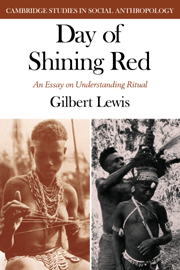Book contents
- Frontmatter
- Contents
- Analytical table of contents
- Preface
- 1 A question of interpretation
- 2 Problems of ritual in general
- 3 Views from one village
- 4 The rites of puberty seen
- 5 Rules of procedure and reflection on them
- 6 Silent forms but natural symbols?
- 7 Moon, river and other themes compared
- 8 For success in life
- 9 A choice of magic
- 10 Change and a rite falling into disuse
- 11 Inventory of themes
- References
- Index
- CAMBRIDGE STUDIES IN SOCIAL ANTHROPOLOGY
7 - Moon, river and other themes compared
Published online by Cambridge University Press: 30 October 2009
- Frontmatter
- Contents
- Analytical table of contents
- Preface
- 1 A question of interpretation
- 2 Problems of ritual in general
- 3 Views from one village
- 4 The rites of puberty seen
- 5 Rules of procedure and reflection on them
- 6 Silent forms but natural symbols?
- 7 Moon, river and other themes compared
- 8 For success in life
- 9 A choice of magic
- 10 Change and a rite falling into disuse
- 11 Inventory of themes
- References
- Index
- CAMBRIDGE STUDIES IN SOCIAL ANTHROPOLOGY
Summary
Questioning the Gnau on menstruation led me to conclude that they were undecided and uncertain about its function. What people find curious, demanding or worth investigation, what they probe or search to understand, does vary. Not every man or woman is equally born a natural philosopher; the want to understand is unevenly distributed, the questions framed for differing purposes, the tug of interest and need set by various circumstance. About a thousand people, men, women and children, speak Gnau as their native language. The range of their social intercourse with others round them was limited before the imposition of peace. They bear a culture which is distinctive to them. It occurred to me often to wonder how the encyclopaedia of Gnau knowledge must have varied in each generation according to the chance bestowal of genius, bad memory, curiosity, inattention and pedagogic zeal, when in each generation so small a number of people bore the total load of knowledge for teaching to their children. And from this to wonder whether there might be, in the diversification of knowledge, in the depth, complexity and coherence of answers to most varied questions, differences between cultures which stemmed from the scale of the society, from sheer weight or lack of numbers, so that any given piece of knowledge, each particular connection seen, was statistically less or more likely to be lost as it depended for its transmission on one man or many.
- Type
- Chapter
- Information
- Day of Shining Red , pp. 121 - 133Publisher: Cambridge University PressPrint publication year: 1980



